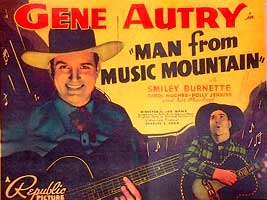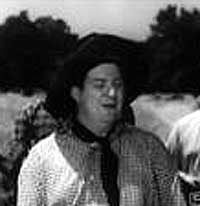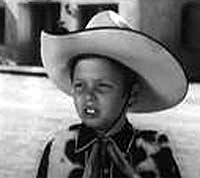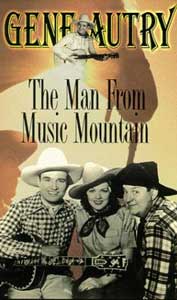 Gene Autry's The Man From Music Mountain (1938) commemorated the completion of Boulder Dam (not renamed Hoover Dam until 1947), which sparked a back-to-the-land movement favorable to The Cowboy Way.
Gene Autry's The Man From Music Mountain (1938) commemorated the completion of Boulder Dam (not renamed Hoover Dam until 1947), which sparked a back-to-the-land movement favorable to The Cowboy Way.
Real estate crook William Scanlon (Ivan Miller) & his cohorts have begun selling a ghost town one building at a time to would-be business owners from big cities. They've been assured that after the new power authority lays its electrical lines from the new dam, then the ghost town of Gold River will once again become the boom town it had been twenty years earlier, before the gold mine ran dry.
Autry happens to be riding near the ghost town with his cowboy buddies. After sweetly singing the title swing song "The Man from Music Mountain," he has to rush to the aid of a rider who has been run off the road by one of those newfangled horseless transport systems, a bus full of city slickers who've bought their little piece of the ghost town & are off to set up their own businesses.
The old man lays dying where he fell from his horse, leaving behind a grandson whom Gene is soon taking under his wing.
Before long Gene has found out the real estate company is crooked. Scanlon knows full well that the electrical lines are not going to run out so far as the Gold River District. But no one will listen to Gene about this, the ghost town's newest residents having already been cheated & unwilling to let go of their hopes.
 Even Gene's comic sidekick Frog (the wonderful Smiley Burnette), who already knew the electricity wasn't coming to the ghost town, is easily hornswoggled into buying a modern appliance shop to sell electric toasters & fans & the like in a town without electricity. Even Gene's comic sidekick Frog (the wonderful Smiley Burnette), who already knew the electricity wasn't coming to the ghost town, is easily hornswoggled into buying a modern appliance shop to sell electric toasters & fans & the like in a town without electricity.
Among the city slickers are two women who've bought an old building to trick out as a modern hair styling salon, hoping to make ends meet giving manicures until the electricity comes available for their equipment. If things are as Gene says, they're ruined before they even get started, having already invested their combined savings.
Gene will soon be falling in love with one of these gals (Carol Hughes). Frog Millhouse will fall for the other (Sally Payne). The love song for the film, "Love Burning Love," is first sung for comic effect by Frog & pals, & eventually sung in earnest by Gene, who'll sing another love song too, "I'm Beginning to Care." Frog & his gal will sing a vaudevillian tune together, "She Works Third Tub in the Laundry." The music is grand stuff!
Some of the conflict isn't from the bad guys but from the city folk themselves, whose motor vehicles frighten horses & endanger cowboys. The film relies on the myth that ranchers were slow to adapt tractors, automobiles, or any modern conveniences, so that in the 1930s you could still find places where the wild west hadn't much changed, the Gold River District being one such place.
Though the idea of such backward ranchers is largely absurd, symbolically it's an effective way of lamenting the loss of the pioneer west, with such marvels as the Boulder Dam symbolizing a new world supplanting one that had already died.
Sundry reasons for action are trumped up along the way. The land developer sends two minions to murder Gene out horse-ridin' on the road. Gene ropes both of them with a single throw of his lasso, yanks them off their horses as one, & leaves them dangling in a tree.
Smiley/Frog sings "All Nice People," an absolutely wonderful & funny drinking tune, backed up by Depression era cowgirl performer Polly Jenkins & Her Plowboys. He then sets out to assist Gene in pulling the wool over the crooked land developer's eyes.
 The old Betsy Lee Mine has been mined out, but Gene salts the mine with gold dust & leaks the news to the developer, who had spiced his ghost town building sales by including in every sales package a percentage of ownership in the worthless mine. The old Betsy Lee Mine has been mined out, but Gene salts the mine with gold dust & leaks the news to the developer, who had spiced his ghost town building sales by including in every sales package a percentage of ownership in the worthless mine.
Scanlon feigns guilty feelings when the city slickers find out they're not going to be on the electrical grid after all. Wanting to make it up to them, he offers to buy their mining interests back, just cuz he's such a good guy yeh right I reckon.
[SPOILER ALERT!] The cute orphan kid is mostly a decoration & doesn't have a lot to do in the film except dress like a cowboy to thrill the youngest fans of Gene Autry, each & every one of whom would've loved to be adopted by him. But the kid is finally worked into the plot when he overhears that there's gold in the mine after all, & informs the city slickers of this before the sell-back is completed.
The kid feels just awful when he realizes he accidentally foiled Gene's attempt to defraud the bad guy. The message here, that it is okay to scam scammers, is probably not as moral as the film was intended to be. But in any case it turns out that Gene's adoptive son has actually saved the day, because a new gold vein really does turn out to be in that old mine, & now every one of those city slickers owns a piece of the pie.
Furthermore, so many people have swarmed to the ghost town that the power authority decided it had better run the electrical grid out there after all, & it's happy ever after for everyone. [END SPOILER ALERT]
This is a sweet little film, loads of fun for kids & grampas & all B western fans. Smiley as Frog has some good comic relief bits, especially when his shop of gizmos goes berzerk.
A major bonus is a guest appearance by Polly Jenkins & Her Musical Plowboys, a marvelous hillbilly band with Polly playing accordion plus a fantastic array of cowbells & reindeer bell-harnesses. Polly performs a swift medley, with Frog joining in for part of it.
Polly was the first woman ever to be a headliner in a western act on the Vaudeville circuit, & later in life devoted herself to USO performances. The Man from Music Mountain provides a rare opportunity to see a sampler of her act.
The film is jam-packed with good tunes, & Gene's own best song for the feature is "Goodbye Pinto," a bluesy western tearjerker about that "pasture in the sky" where all great horses go. As a footnote, director Joe Kane recycled the title of this one about a decade later for a Roy Rogers film, but that one's not at all the same script.
copyright © by Paghat the Ratgirl
|

